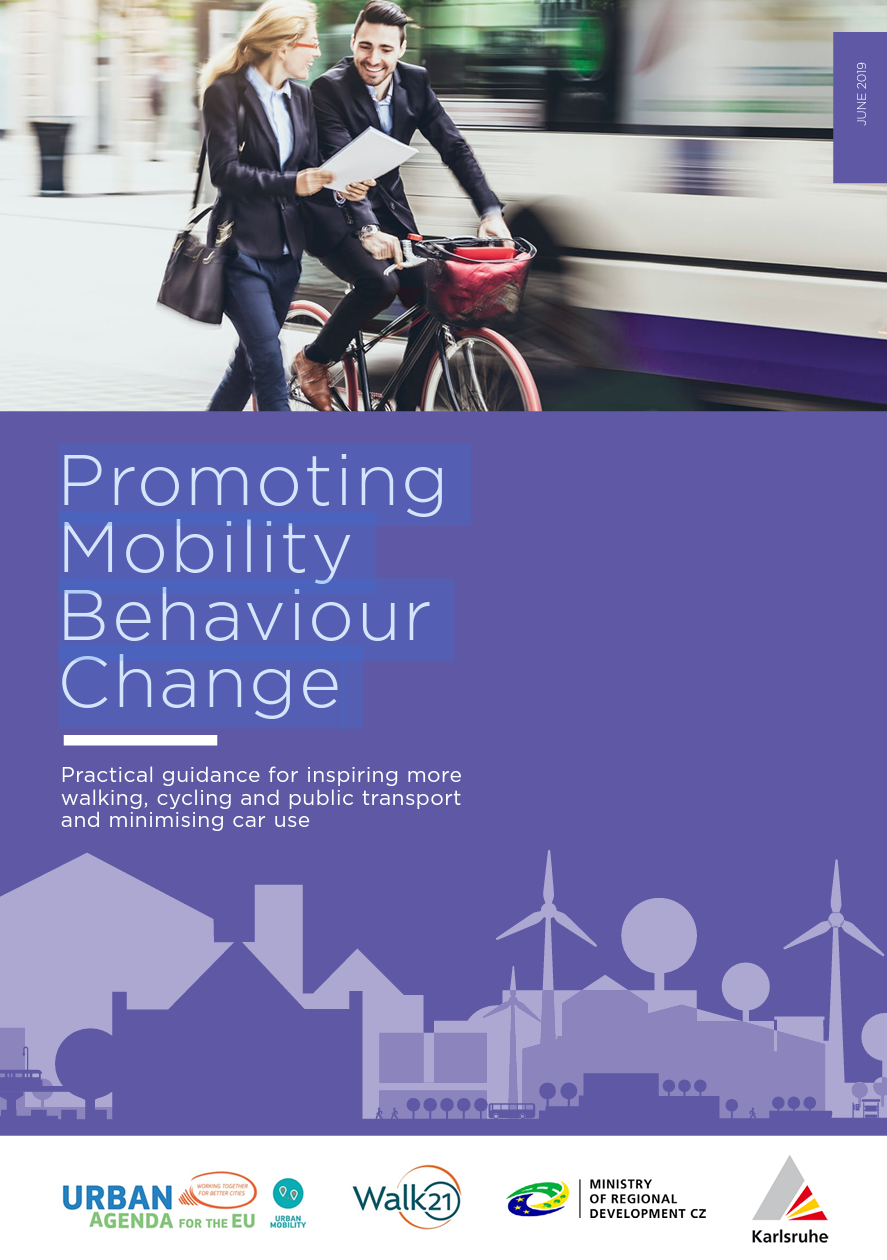Behavioural change is the practice of adopting new travel habits (such as taking public transport, walking and cycling) and reducing existing habits (such as using a car for short local journeys). Behavioural change can be achieved by developing urban mobility strategies that are designed to increase the rates of active travel (walking, cycling, and wheeling), public transport use, and shared mobility along with measures designed to minimise the use of private vehicles. While much of this can be achieved through the implementation of physical measures, communications (promotions, messaging and informing) are essential to encourage individuals and communities to change their behaviour. They are key to informing and inspiring people, they can educate and promote normalisation of new behaviours, and build up people’s confidence in their ability to change. In addition, the COVID-19 pandemic changed behaviour in towns and cities dramatically and involved radical changes in the use of streets and urban spaces which are continuing to evolve. Examples of these approaches are presented below.
n
Travel Behaviour Change Campaigns
Many cities have developed behaviour change campaigns and examples are provided below.
Promoting Mobility Behaviour Change
Partnership for Urban Mobility | 2019 | Germany
There are many existing resources to help European cities develop behaviour change campaigns. This report sets out to understand what common approaches, processes and techniques could help future projects improve their impact. More than a dozen European funded consortium projects have been analysed to underpin this action. Each has produced detailed and helpful monitoring and evaluation reports as well as tried and tested tools and resources many of which can be useful to steer future initiatives going forwards. Collectively they have had an enormous influence on mobility choices in towns and cities across the entire European Union. Based on this analysis, this report provides templates that support any city authority, business, institution or charity that wishes to effect a positive change in mobility behaviour.
n
Travel Behaviour Change Plans and Strategies
Although many cities have developed behaviour change campaigns, several cities have developed specific Travel Behaviour Change Plans and Strategies and examples are provided below.
Glasgow Travel Behaviour Change Strategy
Glasgow | UK | 2023 | 1.7 million inhabitants
The Glasgow transport strategies detail measures which are designed to increase as much as possible the rates of active travel (walking, cycling, and wheeling), public transport use, and other low-carbon forms of transport such as shared mobility. Simultaneously, measures seek to minimise the use of private vehicles. These strategies recognised the importance of and identified the need for a travel behaviour change strategy. The Travel Behaviour Change Strategy (TBCS) is an integral part of these transport-related strategies, and provides the opportunity to focus on supporting people and communities to travel more sustainably. As well as helping to set the overall course of direction for changing people’s travel behaviour in the City, the strategy aims to be a practical resource and provides the framework for developing project-level travel behaviour change plans.
Gold Coast Travel Behaviour Change Plan 2017-2022
Gold Coast | Australia | 2017 | 0.6 million inhabitants
This Gold Coast Travel Behaviour Change Plan 2017-2022 is designed to encourage and enable sustainable travel by residents and visitors. It provides an opportunity is to influence and change travel behaviour, reduce car dependency and significantly increase levels of walking, cycling, carpooling and public transport. The City aims to create awareness, change attitudes and travel behaviours through delivery of four targeted program areas: community; workplaces; schools and tertiary education centres; and events; and aims to reach all residents and visitors. Residents and visitors will be at various stages of change in relation to their travel behaviour. Some will be using sustainable travel regularly whilst others will not have considered the way they travel. The travel behaviour change framework recognises there are various stages of behaviour change and each action identified in this plan aims to target specific stages of change.
n
COVID
Although the worst of the COVID pandemic may be over, remote working is becoming a way of life. Street and urban spaces designs are changing to reduce the impacts of any future outbreaks.
Streets for Pandemic Response & Recovery
NACTO | 2020 | USA
This report aggregates and synthesizes emerging practices in transportation and street design in response to the COVID-19 pandemic. It highlights cities’ current efforts to re-organize streets to best manage this crisis and support economic recovery. This evolving resource is not a comprehensive list of options, nor is it calibrated for the needs of a specific community; every city should assess local context and need, as well as the trajectory of the pandemic in the community, to inform a response and implementation strategy. These emerging practices are organized into standalone implementation sheets. Additional sheets will be released as they are developed in order to help cities rapidly innovate, and this resource will be continually updated and expanded over the coming weeks and months based on evolving practices.






